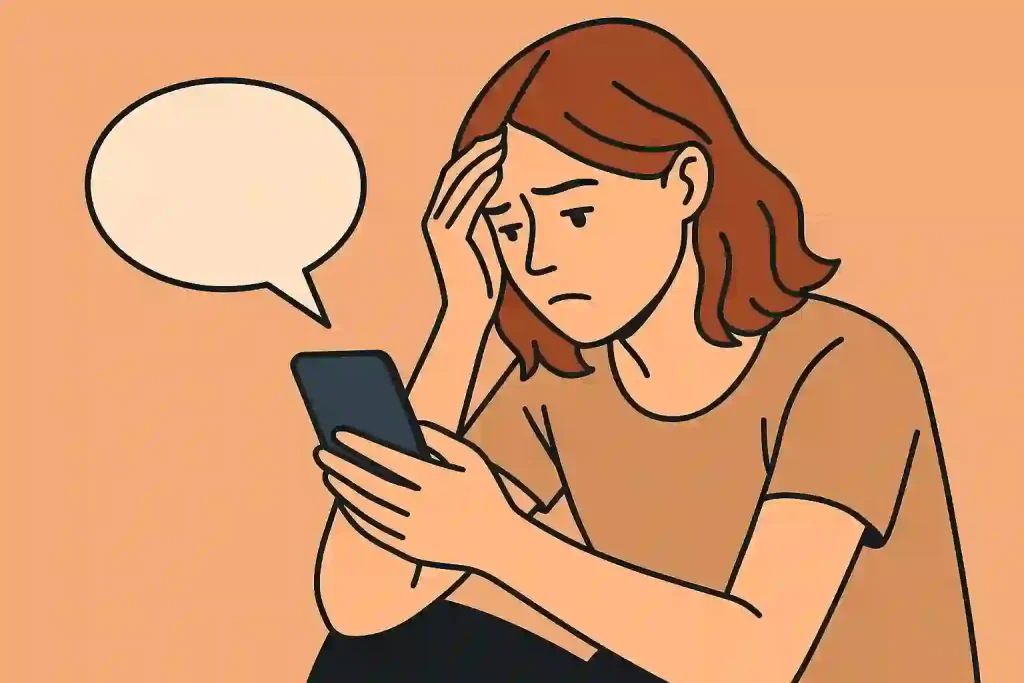Family ghosting is when a relative suddenly cuts off all communication without any explanation. It’s a unique kind of hurt, and figuring out how to get over being ghosted by family requires a different roadmap. Unlike ghosting in dating, this often comes after years of tough situations, toxic dynamics, or emotional pain. Whether you’re thinking about stepping back from your family or you’re the one who was left in silence, understanding this complex issue can help you work through the feelings and decide what’s next for your relationships.
What Is Family Ghosting?
Family ghosting is the act of unilaterally ending all contact with a family member—or the entire family—without a word. One day you’re talking, and the next, your calls go unanswered, texts are left on read, and you’re blocked on social media. It’s a complete and sudden shutdown.
The defining features are the silence and the abruptness. There’s no “we need to talk” conversation or a letter explaining their decision. It’s an exit without a goodbye, leaving the other person with a storm of unanswered questions. This isn’t just a cooling-off period; it’s a deliberate severing of ties, often leaving deep emotional scars because it disregards the shared history and bonds of family.

How Family Ghosting Differs from Going No Contact
It’s easy to confuse ghosting with going no-contact, but they are driven by different intentions.
Going no-contact is usually a thought-out boundary set for self-preservation. A person might say or write something like, “I cannot continue our relationship because it is damaging to my mental health. I need space and will not be in contact.” It’s a painful but clear boundary.
Ghosting, on the other hand, is defined by its lack of communication. While it can still be an act of self-preservation, the method itself can cause intentional or unintentional harm. The person ghosting avoids the confrontation, leaving the other to grapple with confusion and hurt. The core difference is clarity: no-contact provides a reason, while ghosting provides only silence.
Common Reasons People Ghost Family Members
No one decides to cut off their family on a whim. It’s almost always a last resort after years of pain. The reasons are complex and deeply personal, but some common themes emerge.

Toxic Family Dynamics That Lead to Ghosting
Sometimes, the family environment itself is the problem. Years of navigating toxic patterns can wear a person down until disappearing feels like the only way to breathe. These dynamics include:
- Emotional manipulation: Using guilt or threats to control someone.
- Constant criticism: Nothing you do is ever good enough.
- Gaslighting: Making you question your own sanity and perception of events.
- Scapegoating: Blaming one person for all the family’s problems.
- Invalidation: Your feelings and experiences are constantly dismissed or denied.
When these behaviors are the norm, a person might feel that communication is pointless because they will never be truly heard or respected. The only way to stop the cycle is to leave it entirely.
Self-Preservation and Mental Health Protection
This is one of the biggest reasons for ghosting family. Maintaining a relationship with a harmful family member can take a huge toll on your mental health, leading to chronic anxiety, depression, and C-PTSD.
When repeated attempts to resolve issues or set boundaries fail, cutting contact can become a necessary act of survival. It’s not about punishing the other person; it’s about protecting yourself from further harm. It’s a difficult choice, but sometimes your well-being has to come first.
The Emotional Impact of Being Ghosted by Family
Being ghosted by anyone hurts, but when it’s family, the pain is often deeper and more complicated. It can feel like a part of your foundation has been ripped away. The experience is different from when you’ve been ghosted by a friend, as family ties are often seen as permanent.
You might experience a mix of emotions:
- Confusion: The lack of explanation is maddening. You’re left to fill in the blanks, often with worst-case scenarios.
- Abandonment: Feeling left behind by someone who was supposed to be there for you no matter what.
- Betrayal: The trust you had in that relationship is shattered.
- Grief: You’re not just mourning the loss of the person, but the loss of the relationship you thought you had and the future you imagined.
- Self-Blame: It’s almost impossible not to wonder what you did wrong.
Questions You Ask Yourself When Family Ghosts You
The silence can be deafening, and your mind might race to try and make sense of it.
- “What did I do wrong?”
- “Was it that one thing I said last Christmas?”
- “Did I not try hard enough?”
- “Are they right? Am I the toxic one?”
These questions are completely normal. It’s human nature to look for a reason. But it’s important to remember that their decision to ghost is about them and their inability to communicate, not necessarily a reflection of your worth.
Signs That Family Ghosting May Be Coming
Ghosting can feel like it comes out of nowhere, but sometimes there are subtle warning signs. Recognizing them might not prevent the ghosting, but it can help you feel less blindsided.

- Communication fades: They take longer to reply to texts, or their replies become short and impersonal.
- Emotional distance: Conversations stay on the surface. They stop sharing personal details about their life.
- Avoiding gatherings: They consistently have excuses for why they can’t make it to family events.
- Unresolved conflict: A major argument happens, and instead of resolving it, they just pull away.
How to Cope When a Family Member Ghosts You
Finding your footing after a family member ghosts you is a process. Be patient and kind to yourself.
- Allow yourself to grieve: You’ve experienced a significant loss. It’s okay to be sad, angry, or confused. Don’t rush your feelings.
- Resist the urge to demand answers: Constantly calling or texting will likely push them further away and increase your own distress. The closure you’re seeking has to come from within.
- Seek support: Talk to a therapist, a trusted friend, or find a support group for people dealing with family estrangement. You don’t have to go through this alone.
- Focus on what you can control: You can’t control their actions, but you can control how you respond. Invest your energy in the healthy, reciprocal relationships in your life.
- Journal: Writing down your thoughts and feelings can be a powerful way to process the pain without judgment.
Should You Try to Reconnect?
The question of whether to reach out is a heavy one. There’s no right answer, but it helps to think about why you want to reconnect. Are you hoping for an apology? Do you believe things can truly change?
Sometimes, a ghoster does come back. Understanding why ghosters always come back can help you prepare. Often, they return when it’s convenient for them, not because they’ve addressed the underlying issues. Before you open that door, be honest with yourself about whether the relationship was healthy to begin with.
Setting Boundaries If Contact Resumes
If they do reappear and you’re open to reconnecting, boundaries are non-negotiable. This is your chance to reshape the relationship on healthier terms.
- Start slow: You don’t have to jump back into holidays and daily calls. Maybe start with a brief, neutral conversation.
- Communicate your needs clearly: “I need our conversations to be respectful. If you start criticizing me, I will end the call.”
- Protect your peace: Be prepared to walk away again if the old toxic patterns resurface. Your mental health is the priority.
When Ghosting Family Is Your Decision
If you’re the one considering ghosting your family, you’re likely in a lot of pain. It’s a decision born from desperation, but it’s worth pausing to consider the path you take to protect yourself.

Healthier Alternatives to Ghosting
While ghosting might feel like the only option, clear communication—if safe—can sometimes be a healthier path. It reduces the ambiguity that causes so much pain and can prevent feelings of guilt later on.
- The No-Contact Letter: Write a letter explaining that you need space and won’t be in contact. You don’t have to justify your feelings, just state your boundary.
- Low-Contact: Instead of a complete cutoff, you can set firm limits. For example, you only see them at family gatherings, or you only communicate via text.
- Mediated Conversation: With the help of a family therapist, you might be able to have one last conversation to express your feelings in a safe environment.
How to Process Guilt After Cutting Off Family
Even when it’s the right choice, cutting off family comes with a heavy dose of guilt. Society tells us that family is everything, and walking away can feel like a personal failure.
Remind yourself why you made this decision. You are not a bad person for protecting yourself from harm. Working with a therapist can help you process these complex feelings and affirm that prioritizing your well-being is not selfish—it’s necessary.
Moving Forward After Family Ghosting
Whether you were ghosted or you were the one who left, it is possible to build a happy and fulfilling life.
Your healing journey might include:
- Creating a “chosen family”: Surround yourself with supportive friends who respect and validate you.
- Healing your trauma: Working with a professional can help you unpack the baggage from your family of origin.
- Redefining “family”: Family doesn’t have to be blood. It can be the community you build.
- Building self-worth: Learn to find your value within yourself, not from the approval of others.
The silence of family ghosting is painful, but it doesn’t have to be the end of your story. Healing takes time, but you can find peace and create a life filled with healthy, loving connections. For more thoughts on wellness and building a life on your own terms, you can always visit us at www.notonetype.org.


Có thể bạn quan tâm
How to Be a Better Wife: Practical Ways to Strengthen Your Marriage
Being a wife is a role that evolves. Some days it feels natural, and other...
Dec
Essential Advice for Building a Strong, Lasting Relationship
Building a relationship that lasts takes more than just love—it requires consistent effort, open communication,...
Dec
How to Deal with an Angry Partner: Effective Strategies for a Healthier Relationship
Dealing with a partner who frequently expresses anger can feel overwhelming. It’s emotionally draining. Whether...
Dec
How to Deal with Relationship Stress: 7 Proven Ways
Relationship stress affects nearly every couple at some point, causing tension, communication breakdowns, and emotional...
Dec
How to Rebuild Trust in a Relationship: A Step-by-Step Guide
Rebuilding trust after it’s been broken can feel like trying to glue a shattered vase...
Dec
How to Fix a Broken Marriage: 12 Proven Steps to Reconnect
Fixing a broken marriage is possible when both partners commit to the process, even when...
Dec